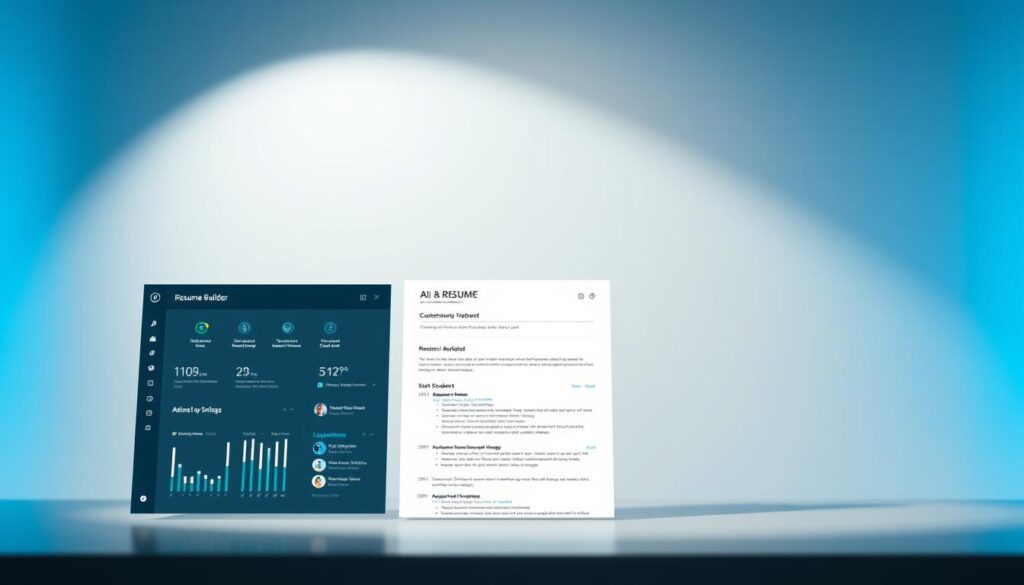Imagine 250 people racing for one job – and the hiring team spends less time reviewing your application than it takes to tie your shoes. That’s the reality of today’s job market. With corporate roles receiving hundreds of submissions, your first impression isn’t just important – it’s everything.
Modern hiring processes use both AI systems and human reviewers to scan content at lightning speed. This means your document must speak two languages: one for algorithms, another for decision-makers. The secret? Strategic word choices that align with job descriptions and industry trends.
This is where precision tools shine. Platforms like RoboApply’s free resume builder analyze millions of job postings to identify critical terminology. Their Auto Apply feature then lets you submit tailored applications across multiple platforms instantly – no manual tweaking required.
Key Takeaways
- Recruiters review applications faster than most coffee breaks (7 seconds average)
- Strategic terminology acts as your digital introduction to employers
- Automated tools analyze job market patterns for targeted optimization
- Multi-channel submission capabilities save hours of manual work
- Real-time feedback ensures alignment with current hiring trends
Your competition isn’t just other candidates – it’s the clock. By combining human insight with smart technology, you create documents that work while you sleep. The result? More interviews, faster responses, and career momentum that grows exponentially.
Understanding the Importance of Resume Keywords
Over 90% of hiring teams now use applicant tracking systems (ATS) to filter submissions. These tools scan documents for specific phrases, rejecting 75% before human eyes ever see them. Your challenge? Craft content that satisfies both digital gatekeepers and decision-makers.
ATS Screening and Human Readability
Modern hiring processes involve two critical checkpoints. First, automated systems search for terminology matching job requirements. If your document lacks these phrases, you’re eliminated instantly – even if you’re qualified. Tools like RoboApply’s ATS optimizer decode what each role demands, helping you include essential criteria.
The Digital Handshake with Employers
Strategic terminology acts like a professional introduction. It tells hiring managers, “I speak your language” while proving your relevance to software filters. Platforms analyzing current job trends help identify which terms carry weight in your field. This dual approach ensures your application survives initial scans and impresses during detailed reviews.
Balancing technical requirements with engaging content requires precision. One solution? Use strategic formatting that highlights critical skills naturally. When done right, your document becomes a bridge between automated systems and the people ultimately making hiring decisions.
Overview of Roboapply and Its Keyword Tools
Modern job applications require precision tools that handle technical demands while maintaining human appeal. RoboApply’s platform merges artificial intelligence with industry expertise to create documents that resonate with both hiring software and managers.

AI Resume and Cover Letter Builder
This feature acts as your personal career strategist. It scans thousands of active listings in your field, identifying patterns in required skills and preferred terminology. The system then automatically adjusts your language to match these trends while preserving your unique professional voice.
For cover letters, the tool suggests context-aware phrases that align with specific employers’ values. This ensures every application feels tailored rather than generic – a critical factor when competing against hundreds of candidates.
Grammar Checker and ATS Optimizer
Beyond fixing typos, this feature evaluates how well your terminology integrates with industry standards. It flags overused phrases and suggests stronger alternatives that maintain authenticity while boosting searchability.
The ATS optimizer compares your document against real employer requirements, scoring its compatibility with common screening systems. For example, those applying to entry-level IT roles receive targeted feedback on technical vocabulary placement and formatting best practices.
Mastering roboapply resume keyword research
Your application needs to answer two questions simultaneously: “What can you do?” and “How do you fit?” Specialized terminology bridges this gap by translating your experience into employer priorities. Unlike generic SEO strategies, this approach targets human decision-makers and their digital filters.
Definition and Core Benefits
Strategic terminology falls into four categories:
- Technical abilities: Tools like Python or Salesforce
- Industry language: Field-specific concepts like “patient triage” or “agile workflows”
- Role requirements: Phrases from job postings like “cross-functional collaboration”
- Transferable skills: Broad competencies like “budget management”
Platforms using AI analysis spot patterns in successful applications. For example, marketing roles might prioritize “conversion rate optimization” over “social media management.” One user increased interview requests by 40% after adding “salesforce automation” and “lead scoring models” to their document.
Effective tools compare your content against current openings, highlighting gaps between your wording and employer needs. This creates alignment with both applicant tracking systems and hiring teams reviewing finalists.
Build your terminology bank by scanning three sources:
- Job descriptions from target companies
- LinkedIn profiles of industry leaders
- Annual reports mentioning strategic priorities
Keyword Research: Finding the Right Terms for Your Industry
Every field has its secret handshake – the specific phrases employers use to verify your expertise. Use the wrong terms, and your application disappears. Use the right ones, and you become an instant contender.

Tech professionals thrive when listing tools like Python or cloud infrastructure management. Healthcare candidates stand out with EMR systems and HIPAA compliance expertise. Finance applicants gain traction through financial modeling and risk assessment frameworks.
Three steps help identify what matters in your field:
- Analyze 10+ current job descriptions for repeated requirements
- Compare successful professionals’ profiles on LinkedIn
- Track emerging technologies mentioned in industry reports
Specialized platforms categorize terms by sector, showing which skills get 73% more attention from hiring teams. One user doubled interview requests after adding “supply chain automation” and “inventory optimization” to their manufacturing-focused document.
Balance widely recognized terms with niche expertise. For example, marketers might pair SEO strategy with voice search optimization. This approach satisfies automated screens while demonstrating unique value to human reviewers.
Update your terminology bank quarterly. Set calendar reminders to check industry publications and updated job postings. Tools offering real-time trend analysis help maintain relevance as hiring priorities shift.
Utilizing Job Descriptions to Extract Relevant Keywords
Job postings hold the blueprint for application success. They reveal exactly what employers use to filter candidates. Start by gathering 5-10 listings for your target role. Look beyond surface requirements – focus on repeated phrases in responsibilities and qualifications.
Actionable Tips from Job Postings
Scan each listing like a detective. Highlight verbs like “manage” or “develop” and industry-specific tools. Group similar skills across postings to spot priorities. For example:
- Digital marketing roles often repeat “SEO audits” and “conversion funnels”
- Project management positions emphasize “stakeholder alignment” and “budget tracking”
Advanced tools compare multiple listings instantly. They rank keywords by frequency, showing which terms demand immediate attention. This approach cuts analysis time by 80% compared to manual reviews.
Extracting Industry-Specific Terminology
Every field has hidden language. Healthcare values “patient outcomes” and “EMR systems”. Tech prioritizes “cloud migration” and “CI/CD pipelines”. Capture both explicit terms and implied concepts like “scalable solutions” or “cross-functional leadership”.
Combine this data with your work experience for authentic integration. Instead of forcing terms, show how you’ve applied these skills in real scenarios. Need more listings? Explore leading job search engines to expand your research pool efficiently.
Integrating Technical and Soft Skills Keywords
Modern employers demand dual competency: mastery of tools and the ability to collaborate effectively. Your document must reflect this balance to pass automated screens and impress hiring managers. Strategic balance of competencies separates standout candidates from generic applicants.

Highlighting Technical Expertise
List specific tools like Python or Tableau instead of vague terms like “data analysis.” Hiring systems prioritize exact matches for industry-standard software. For engineering roles, terms like CAD modeling or thermal dynamics demonstrate niche proficiency.
Use platforms like RoboApply’s Skills Analyzer to identify trending technical terms in your field. One user gained 22% more interviews after replacing “managed projects” with Jira workflow optimization and Scrum leadership.
Showcasing Essential Soft Skills
Replace overused phrases like “team player” with context-specific examples. Instead of claiming “strong communication,” describe mediating client-vendor negotiations or training cross-departmental teams.
Effective tools analyze job descriptions to recommend soft skill terminology. For leadership roles, terms like conflict resolution frameworks or stakeholder alignment strategies prove emotional intelligence. Pair these with quantifiable results to demonstrate impact.
Need inspiration? Explore industry-specific examples showing how professionals weave technical and interpersonal abilities seamlessly. Update your terminology quarterly to reflect evolving employer priorities in both skill categories.
Action Verbs and Power Words: Energizing Your Resume
Your document needs verbs that spark immediate recognition – terms hiring teams associate with decisive professionals. Weak phrases like “responsible for” disappear in application stacks. Strong action language makes employers lean forward.

Replace passive phrases with verbs that showcase results. Instead of “helped with team projects,” try “orchestrated cross-department initiatives reducing production delays by 18%.” Quantify outcomes where possible – numbers make your impact undeniable.
Three categories of power terms elevate your content:
- Leadership: Spearheaded, championed, mobilized
- Problem-solving: Rectified, overhauled, mitigated
- Innovation: Pioneered, engineered, transformed
One marketing director landed 3 interviews in a week by swapping “managed campaigns” with “accelerated lead generation through multi-channel optimization.” Tools analyzing job descriptions suggest verbs matching your industry’s priorities. They flag overused terms like “led” and propose fresher alternatives.
“Candidates using achievement-focused language receive 63% more recruiter callbacks than those relying on generic descriptions.”
Pair these verbs with measurable outcomes for maximum effect. For instance: “Streamlined inventory management” becomes “Slashed excess stock by 41% through automated tracking systems.” Explore professional achievements examples to see how top performers structure their bullet points.
Update your action terms quarterly. Track emerging verbs in job postings and industry reports. This ensures your language stays aligned with evolving employer expectations while maintaining authenticity.
Common Mistakes in Resume Keyword Optimization
Balancing technical requirements with genuine storytelling separates successful candidates from the rest. Even experienced professionals stumble when trying to satisfy applicant tracking systems while keeping their documents authentic. Let’s explore how to avoid pitfalls that trigger rejections.
Avoiding Keyword Stuffing
Overloading your document with repetitive terms triggers rejection alerts. Quality matters more than quantity – aim for 25-30 naturally integrated phrases. For example, instead of listing “project management” five times, demonstrate it through varied achievements like:
- “Coordinated cross-functional teams using Agile methodology”
- “Reduced timelines 30% through workflow optimization”
Watch for red flags: identical phrases in consecutive bullet points or skills sections that read like keyword lists. Tools analyzing tracking systems compatibility can spot unnatural repetition before submission.
Maintaining Authenticity and Balance
Your document should sound like you, not a robot. Blend required terms with your unique value. If a job posting emphasizes “data visualization,” show how you “transformed raw metrics into executive dashboards using Tableau.”
Successful applicants combine strategic terminology with personal achievements. One project manager increased interview invites by 60% after replacing generic phrases with specific process improvements. Remember: algorithms scan for relevance, but humans hire for fit.
FAQ
Why do resume keywords matter for applicant tracking systems?
Applicant tracking systems (ATS) like Greenhouse or Workday scan resumes for specific terms to filter candidates. Using industry-relevant keywords ensures your resume passes automated screenings while remaining readable for hiring managers. Match terms from the job description to align with both ATS algorithms and employer expectations.
How do I extract keywords from a job posting effectively?
Start by highlighting repeated phrases, technical skills (e.g., “Python” or “CRM software”), and action verbs like “managed” or “optimized.” Tools like Google Docs’ “Explore” feature or TextAnalyzer can identify high-frequency terms. Prioritize skills and certifications explicitly listed in the “Requirements” section.
Should I prioritize technical skills over soft skills in my resume?
Balance both. Showcase hard skills like “data analysis” or “SEO strategy” in your work experience section, while integrating soft skills such as “cross-functional collaboration” or “strategic planning” in summaries or achievements. Employers like IBM and Microsoft value this blend for roles requiring teamwork and technical expertise.
How can action verbs improve my resume’s impact?
Verbs like “spearheaded,” “engineered,” or “streamlined” add energy and specificity. Instead of “responsible for,” write “led a 10-member team to reduce costs by 15%.” This approach aligns with ATS preferences and human readers’ expectations for clarity.
What’s the biggest mistake job seekers make with resume keywords?
Overloading your resume with irrelevant terms. For example, stuffing “digital marketing” into an engineering resume harms authenticity. Use tools like Jobscan or LinkedIn’s Skills Insights to identify high-value keywords without sacrificing natural language.
How do I identify industry-specific keywords for my field?
Research trending terms on platforms like Glassdoor or industry reports. For healthcare, include “HIPAA compliance” or “patient triage.” In tech, highlight “Agile workflows” or “cloud infrastructure.” Tailor your resume using terms from target companies’ websites or recent job postings.
Can I reuse the same keywords across multiple applications?
Customize keywords for each role. A project management resume for Amazon might emphasize “stakeholder engagement,” while one for Tesla could focus on “supply chain optimization.” Tools like TealHQ’s Resume Builder help automate this process while maintaining consistency.
How do I integrate keywords without sounding robotic?
Weave keywords into achievement-focused bullet points. Instead of listing “social media management,” write “Increased Instagram engagement by 40% through targeted content calendars and analytics tools.” This balances ATS requirements with human-centric storytelling.


















